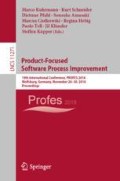Abstract
Mobile apps have penetrated the market and are used everywhere. The success of apps also depends on user feedback as this enables users to influence other potential customers and provides new opportunities for identifying features. An efficient development process including quality assurance is obligatory for app-developing companies. However, developers also face challenges, such as short time to market, many release cycles, or low budgets for quality assurance. Therefore, we present a lightweight approach that considers textual feedback from users and a corresponding tool chain. With this, quality can be monitored and development and quality assurance decisions for upcoming sprints can be made fast and easily. Furthermore, examples of such textual analyses show how the approach can provide information to improve apps.
Access this chapter
Tax calculation will be finalised at checkout
Purchases are for personal use only
References
statista: Number of apps available in leading app stores as of 1st quarter 2018. https://www.statista.com/statistics/276623/number-of-apps-available-in-leading-app-stores/. Accessed 2018
Elberzhager, F., Holl, K., Karn, B., Immich, T.: Rapid lean UX development through user feedback revelation. In: PROFES 2017: Product-Focused Software Process Improvement (2017)
Scherr, S., Elberzhager, F., Holl, K.: An automated feedback-based approach to support mobile app development. In: Proceedings - 43rd Euromicro Conference on Software Engineering and Advanced Applications, SEAA 2017, Vienna (2017)
Hussein: A survey on sentiment analysis challenges. Journal of King Saud University - Engineering Sciences (2016)
Ribeiro, F., Araújo, M., Gonçalves, M., Benevenuto, F.: SentiBench - a benchmark comparison of state-of-the-practice sentiment analysis methods. EPJ Data Sci. 5(1) (2016). https://doi.org/10.1140/epjds/s13688-016-0085-1
Hogenboom, A., Bal, M., Frasincar, F., Bal, D.: Towards cross-language sentiment analysis through universal star ratings. Adv. Intell. Syst. Comput. 172, 69–79 (2013)
Dashtipour, K., Poria, S., Hussain, A., Cambria, E., Hawalah, A., Gelbukh, A., Zhou, Q.: Multilingual sentiment analysis: state of the art and independent comparison of techniques. Cogn. Comput. 8, 757–771 (2016)
Lazarus, R.: Emotion & Adaptation (1991)
Provine, R., Spencer, R., Mandell, D.: Emotional expression online. J. Lang. Soc. Psychol. 26(3), 299–307 (2007)
Ekman, P., Friesen, W.: Constants across cultures in the face and emotion. J. Pers. Soc. Psychol. 17(2), 124–129 (1971)
Plutchik, R.: A general psychoevolutionary theory of emotion. In: Theories of Emotion, pp. 3–33 (1980)
Scherr, S., Polst, S., Müller, L., Holl, K., Elberzhager, F.: The perception of emojis for analyzing app feedback. Int. J. Interact. Mob. Technol. (accepted)
Scherr, S., Elberzhager, F., Meyer, S.: Listen to your users - quality improvement of mobile apps through lightweight feedback analyses. In: International Conference on Software Quality (2019)
Jozef Stefan Institute: LemmaGen. http://lemmatise.ijs.si. Accessed 2010
Wong, J.: Uber CEO steps down from Trump advisory council after users boycott. https://www.theguardian.com/technology/2017/feb/02/travis-kalanick-delete-uber-leaves-trump-council. Accessed 3 Feb 2017
O., K.: Goodbye, Like button. https://newsroom.pinterest.com/en/post/goodbye-like-button. Accessed 20 Apr 2017
Fingas, J.: Tinder suffers sign-in problems following Facebook’s privacy changes. https://www.engadget.com/2018/04/04/tinder-sign-in-problems-following-facebook-changes/. Accessed 04 Apr 2018
Acknowledgments
The research described in this paper was performed in the project Opti4Apps (grant no. 02K14A182) of the German Federal Ministry of Education and Research (BMBF). We thank Sonnhild Namingha for proofreading.
Author information
Authors and Affiliations
Corresponding author
Editor information
Editors and Affiliations
Rights and permissions
Copyright information
© 2018 Springer Nature Switzerland AG
About this paper
Cite this paper
Scherr, S.A., Elberzhager, F., Müller, L. (2018). Quality Improvement of Mobile Apps – Tool-Supported Lightweight Feedback Analyses. In: Kuhrmann, M., et al. Product-Focused Software Process Improvement. PROFES 2018. Lecture Notes in Computer Science(), vol 11271. Springer, Cham. https://doi.org/10.1007/978-3-030-03673-7_29
Download citation
DOI: https://doi.org/10.1007/978-3-030-03673-7_29
Published:
Publisher Name: Springer, Cham
Print ISBN: 978-3-030-03672-0
Online ISBN: 978-3-030-03673-7
eBook Packages: Computer ScienceComputer Science (R0)

